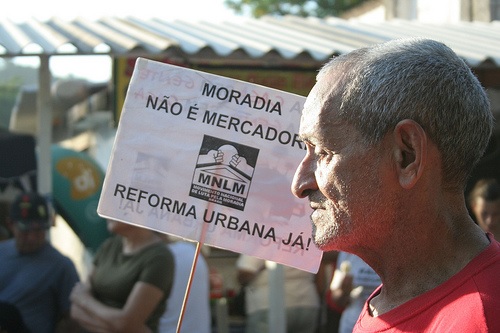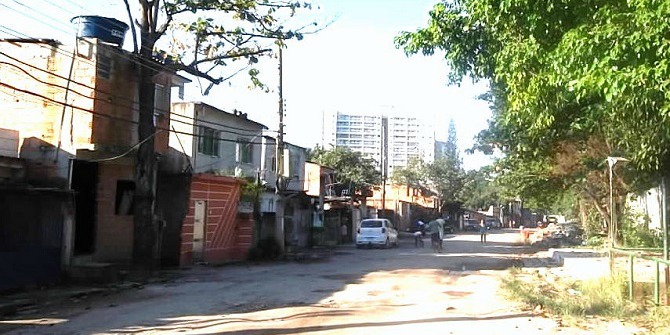

 Brazil has been preparing furiously for the upcoming World Cup and 2016 Olympics. While these developments are thought to represent the country’s growing economy and rising middle class, such “progress” has come at the expense of Brazil’s poorest citizens. Sue Brownill, Ramin Keivani, and Erick Omena de Melo look at the forced evictions in Vila Autódromo to make way for Olympic venues, in spite of the residents’ legal title to their site, arguing that it is representative of global trends of market and state forces eroding people’s right to the city.
Brazil has been preparing furiously for the upcoming World Cup and 2016 Olympics. While these developments are thought to represent the country’s growing economy and rising middle class, such “progress” has come at the expense of Brazil’s poorest citizens. Sue Brownill, Ramin Keivani, and Erick Omena de Melo look at the forced evictions in Vila Autódromo to make way for Olympic venues, in spite of the residents’ legal title to their site, arguing that it is representative of global trends of market and state forces eroding people’s right to the city.
The continuing efforts of the Brazilian authorities to present the ‘right’ face to visitors to the up-coming mega events was in the news again recently with the occupation of the Mare favela in northern Rio. While these high profile events grab the world media’s attention, on the other the side of the capital, right beside the Olympic park in Barra da Tijuca, another community is facing eviction from a less well reported, but arguably more insidious process.Residents of Vila Autódromo in Barra Da Tijuca which sits right alongside the fence of the Olympic site were given legal title to their site in the 1990s. Even AECOM, the consultants drawing up the Masterplan for the site (incidentally the same ones responsible for the Stratford Masterplan for the London Olympics) included them in their first sketches for the development. And yet there have been successive proposals to evict them to make way for the Olympic Park.
The community has fought a long campaign to stay on their site including taking action through the courts and presenting an alternative plan which would allow them to stay and the park to be built. They have been supported by the Rio State Public Defenders’ Office, a body set up under the Brazilian constitution to protect citizen’s rights, whose Housing and Lands Office has been for years fighting plan after plan for eviction. The alternative plan, which won a prestigious Deutsche Bank Urban Age award in 2013, was drawn up with support from local Universities and NGOs and presented to Mayor Eduardo Paes on 16th of August 2013, a few weeks after Brazil’ s hosting of mega-events had once more gained global interest due to the large scale public demonstrations against them. A further stay of eviction resulted.

However since that time the authorities have been working to split the community at Vila Autódromo. Residents are being offered alternative accommodation in the Parque Carioca federal housing program which is being publicized as a showpiece project by the municipality compared to the amenities at Vila Autódromo. Nevertheless around half of the community has chosen to stay while another half, ground down by years of uncertainty and lack of public investment in their settlement, have accepted the offer to move. These residents were (wrongly) told that in order to get the keys to their new properties their existing houses would need to be demolished. This resulted in a lifting of the injunction preventing demolition to begin the process of selective clearance, sending out a clear message to the remaining residents who now have to live among large scale demolitions and the resultant debris and disruption to their community.
According to public defenders on the ground, this demolition was not required according to the terms of the previous injunction. Furthermore, the injunction served the interests of all residents, both those who wanted to stay and those who wanted to leave, by providing additional protection and guarantees to negotiate with the municipality. It is ironic therefore that the recent action in overturning the injunction was agreed by the leadership of the Public Defender’s Office, which is there to protect citizens, under pressure from the municipality and actively excluding the Housing and Land Section of the Public Defenders’ Office who have represented the community. In this respect Rio Watch, a dedicated community reporting website in the city, notes “For the first time in the history of the Brazilian Judiciary, the Defender-General himself, Nilson Bruno interfered in the case, requesting to overthrow the injunction. This behavior is, at the very least, irregular, since he overrode lawyers who were managing the case and should have autonomy.” Activists challenged that these Public Defenders appear to be upholding the private interests of City officials to the detriment of those families who fight to remain in Vila Autódromo.
Vila Autódromo’s experience needs to be put into a wider context. Current estimates are that around 22,000 people have been or could be evicted from their homes to make way for the sites, car parks and the rapid bus transport routes being put in place for the World Cup in 2014 and the Games in 2016 (this rises to 170,000 if other World Cup cities are included). Some are offered alternative accommodation but much of this is in the outer suburbs far away from work, family and schools. Others will only be given the price of the materials they have used to build their homes. At the same time all the residential development from the games, including the athletes’ village, will be for middle to high income private housing. Yet other favelas are being developed for ‘poverty tourism’ with designated routes for visitors through areas that have been ‘pacified’ through the anti-drugs and crime programs. Demolitions to make way for the teleferiques (cable car) and walkways needed to provide access are occurring in these communities although it is also recognized there could be some economic benefits to local residents and traders.

Officially this is presented as a sign of how Brazil is developing as a nation; with a growing economy, the rise of an affluent middle-class and fewer favela dwellers. The legacy of the games, it is argued, will be to strengthen this trajectory. However, the upgrading of the stadiums such as the iconic Maracana for the World Cup have increased ticket prices and reduced the number of seats and Barra is not a brownfield regeneration site as in London, but an affluent ‘new town’ some kilometers to the west of the center where the current Mayor of Rio started his political career. This underlines how nebulous a concept legacy is and how important it is to build in clear objectives and to plan programs from the start. The IOC, whose charter includes such principles as respect for ‘universal ethical values’ and ‘social responsibility’ and FIFA should take note of what goes on in the name of the sporting mega-events and put pressure on organizing committees and delivery authorities to ensure a fair and inclusive legacy emerges.
Over the last twenty-five years, Brazil became world-renowned for its major contributions to the promotion of the right to the city. Progressive elements were brought forward by its Federal Constitution (such as the Public Defenders’ Office), the Statute of the City (which enshrined rights of consultation and promoted equity) and through Participatory Budgeting experiences such as at Porto Alegre. However, the scale of evictions and the lack of public participation in the run-up to the Olympics and the World Cup clearly overshadow these previous advances. Gentrification/touristification coupled with the militarization of favelas also point to the erosion of the already fragile rights of the poorest people in Brazil. In this sense, the Vila Autódromo situation is emblematic of a worldwide context where market and state forces have been intensifying their erosion of people`s rights to urban space (be it Turkish public parks, or travellers’ sites in England). That`s why it should be the object of attention from the media, academics and all those concerned to see social justice in the world’s cities.
Further information on ways to support threatened communities can be found at http://catcomm.org
Please read our comments policy before commenting.
Note: This article gives the views of the author, and not the position of USApp– American Politics and Policy, nor of the London School of Economics.
Shortened URL for this post: http://bit.ly/1hEmg80
_________________________________________
 Sue Brownill- Oxford Brookes University
Sue Brownill- Oxford Brookes University
Sue Brownill is a Reader in Urban Policy and Governance at Oxford Brookes University. Her research and teaching interests focus on the interaction of communities with urban planning and regeneration. She is also the Postgraduate Research Tutor for the department with responsibilities for leading the PhD programme and co-ordinating and delivering doctoral research methods training. Sue combines her academic interests with involvement with community and housing groups. She has been a board member of Oxford Citizens Housing Association since 2003 and before moving to Oxford worked with community organisations in London’s Docklands.
 Ramin Keivani- Oxford Brookes University
Ramin Keivani- Oxford Brookes University
Ramin Keivani is a Reader in International Land Policy and Urban Development at Oxford Brookes University. He is an urban development specialist with a particular interest on the interface of economic globalisation, development of land markets and urban growth and their impact on urban equity and sustainability, particularly in relation to low income land and housing provision in developing and transition economies. Ramin is also the founding and managing editor of the International Journal of Urban Sustainable Development and sits on the steering group for the UN-Habitat World Urban Campaign.
 Erick Omena de Melo – Oxford Brookes University
Erick Omena de Melo – Oxford Brookes University
Erick Omena de Melo is a PhD candidate in Planning at Oxford Brookes University. His research interests focus on the interface of social movements, urban governance,urban theory and mega events. He has worked at the Federal University of Rio de Janeiro as a member of the coordination team of the project “Metropolization and mega-events”, which carried out research about the urban impacts of the Olympics and the World Cup in Brazil with a particular emphasis on the relationship between universities and civil society. Erick has also collaborated with social movements such as the People’s Committee for the World Cup and the Olympics and the Brazilian National Fans Association.




1 Comments